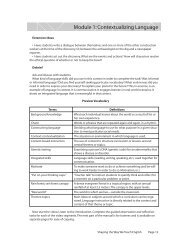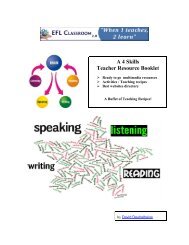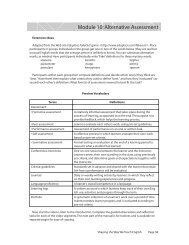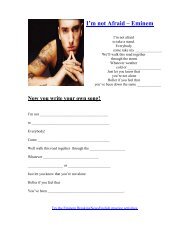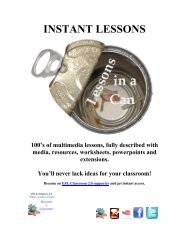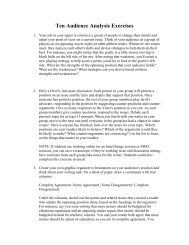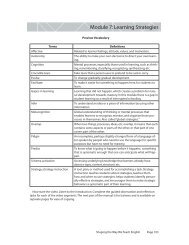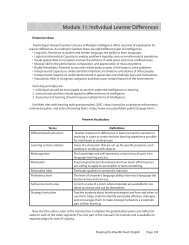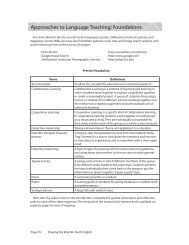Module 5: Learner Feedback - EFL Classroom 2.0
Module 5: Learner Feedback - EFL Classroom 2.0
Module 5: Learner Feedback - EFL Classroom 2.0
Create successful ePaper yourself
Turn your PDF publications into a flip-book with our unique Google optimized e-Paper software.
Approaches to Language Teaching: Foundations<br />
Introduction, Expanded Narrative<br />
<strong>Module</strong> 5, <strong>Learner</strong> <strong>Feedback</strong><br />
Appropriate feedback is necessary for effective and efficient learning. Incorrectness is not the only<br />
standard teachers can use to assess learning. This module considers learner feedback in these three<br />
domains:<br />
1. <strong>Feedback</strong> can be linguistic in nature and relate to the actual use of the language.<br />
2. It can also focus on communication, which concerns the task or the content of the message.<br />
3. And, finally, feedback can be affective, encouraging learners’ attempts to communicate and to<br />
use the language. The purpose of affective feedback is to build confidence.<br />
There are several important aspects to consider when giving feedback:<br />
• Both positive and negative feedback are needed for the most effective learning. Negative feedback<br />
is direct error correction or drawing attention to error. Positive feedback can be affective, can<br />
reward for correct or successful communication, or can provide the opportunity for self-correction.<br />
• <strong>Feedback</strong> can be oral, written, or non-verbal; it can be given to individuals, groups, or the entire<br />
class.<br />
• <strong>Feedback</strong> can be given immediately or delayed, depending on which would be most effective for<br />
the task or situation?<br />
• <strong>Feedback</strong> can be either formative or summative. Formative feedback isn’t usually graded and is<br />
given at all stages throughout the learning period. Summative feedback is given at the conclusion of<br />
a unit, a project, or a period of learning. This can be a grade or a final report on students’ work.<br />
• It is important to understand the nature of an error in order to determine whether and how to<br />
use corrective feedback.<br />
<strong>Module</strong> Focus<br />
The focus in this module is formative feedback. Formative feedback is continuous, and it can<br />
encourage or discourage the learner. Teachers need to learn how to use techniques that encourage<br />
learners and that give them confidence. They need to learn how to avoid techniques that discourage<br />
learners, that embarrass them, or make them feel “stupid.”<br />
Some general guidelines for what to do, and what not to do:<br />
• Understand why the error occurred. Did the student not know how to produce the correct language,<br />
or did they make a careless mistake?<br />
• Determine the type of error. If it was a language error, what kind of error was it? Grammar? Vocabulary?<br />
Pragmatic in nature (inappropriate usage)?<br />
• Make the feedback fit both the kind of error and the context in which it occurred. Avoid trying<br />
to correct every error. The teacher must decide whether the error is important enough to correct,<br />
whether it prevents understanding, or whether fluency is more important for this task, so some errors<br />
can be overlooked.<br />
• Avoid over-correction and too much negative feedback. Whenever possible, use feedback techniques<br />
that allow learners to self-correct, either individually or in groups.<br />
• Above all, encourage student learning through positive feedback. Tell students that making mistakes<br />
helps them learn. Help students be successful and confident. Use positive feedback techniques<br />
that help to create a comfortable atmosphere in which students see making mistakes as part of the<br />
learning process.<br />
Page 47<br />
Shaping the Way We Teach English



